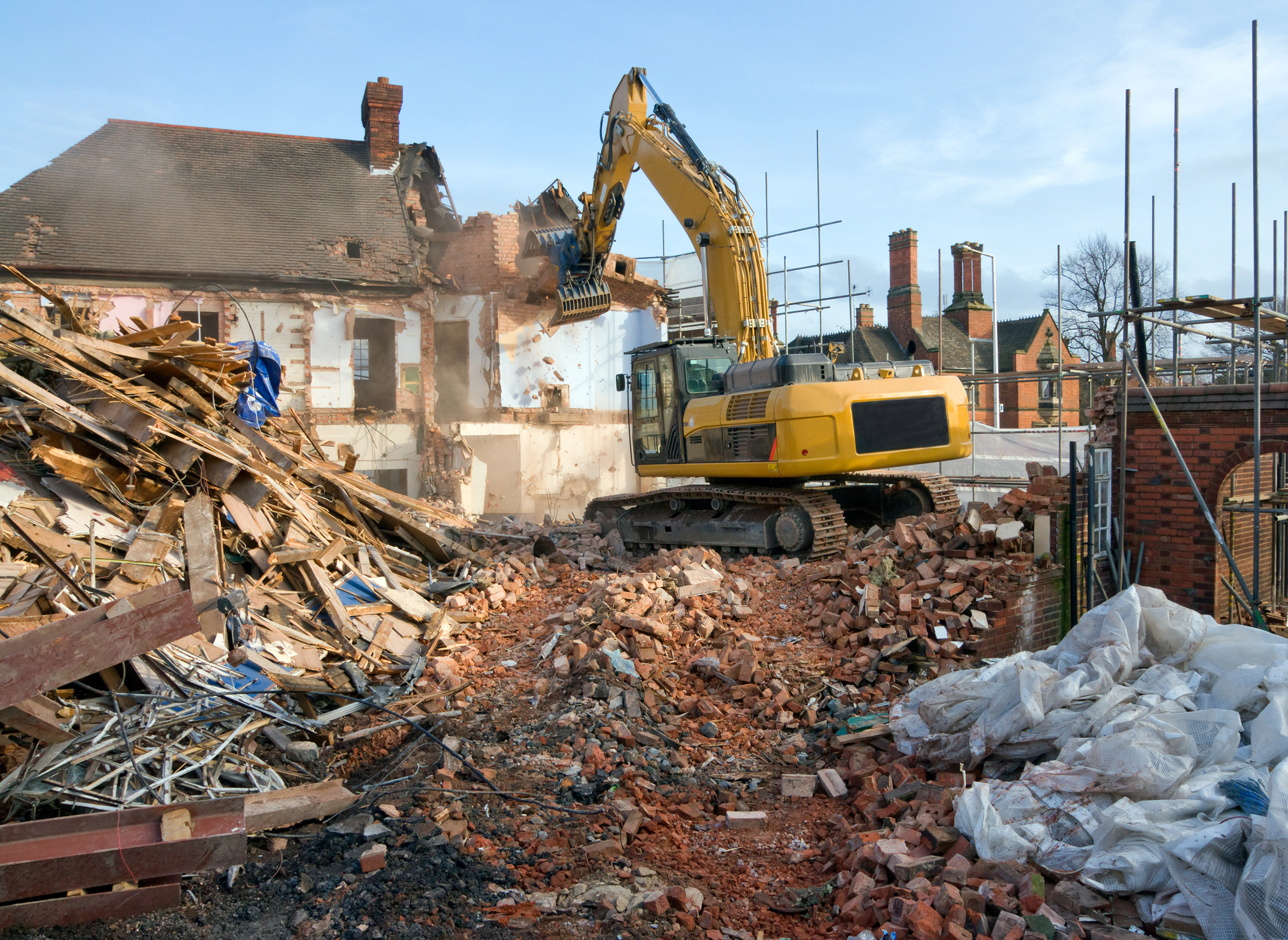House Demolition: Your Questions Answered!
Follow this guide to house demolition if your perfect plot has already been developed and features an existing dwelling that is beyond salvation

It’s highly likely that in your quest for the perfect piece of land for your dream home, you’ll come across a previously developed plot.
These are known as ‘knock-downs’ or replacement plots: land occupied by an existing dwelling that is, for one reason or another, not worth restoring or extending and so lends itself to demolition and replacement.
The existing house might be poorly designed or positioned, too small for the size and value of the land it stands on, or simply beyond economic repair or improvement — its fate sealed by the fact that a new dwelling benefits from 0% VAT whilst renovation and extension work is usually rated at 20%.
How Much Does House Demolition Cost?
The cost of demolishing a house ranges from £6,000-£8,000 for a small 80-120m² detached property, up to £12,000-£15,000 for a more substantial property of 200-250m².
Demolition costs will be mitigated if there are materials with salvage value. A demolition contractor (find one at demolition-nfdc.com) will list the value of any salvage items and offset this against the quote for demolition work and site clearance.
Existing service connections to electricity, mains water and sewerage, and connection to the highway can usually be reused, which can represent a significant saving compared to developing a virgin plot.
A large part of the cost of demolition is landfill and haulage, so costs can be reduced if there is scope to reuse or dispose of non-toxic waste on site — such as clean hardcore for drives, paths, terraces and soakaways.
How Long Does it Take to Demolish a House?
The time taken for demolition work depends on scale and complexity but will typically take four to eight days. If the building is a semi or terraced house, the adjoining buildings will require support following demolition, adding to the cost.
If there is specialist work required, such as removing asbestos (often found in the form of cladding, roofing and rainwater goods) this can complicate issues. There are strict rules on the removal and handling of asbestos, and it can be best to get a report and quote from a specialist contractor.
Environmental Impact
In a rural area it is likely that a wildlife survey undertaken by an ecological consultant will be requested by the local planning authority, as part of the pre-application process for a replacement dwelling.
If evidence of endangered species is detected (typically bats, barn owls, badgers and great crested newts), a further report will be required from a specialist before work can proceed, and this will recommend the time of year that demolition work can take place and the mitigation measures required, such as providing alternative habitats.
Typical Order of Works for a House Demolition
The following order of works is typical for demolishing a house:
- Cut off and cap all services such as main water and sewer connection, electricity, gas and telephone
- Erect site fencing and protect the site; erect scaffold if required
- Hazardous material (i.e. asbestos) removed under licence or by specialists if necessary
- Soft strip all loose items, kitchen, sanitaryware, and remove all cabling, lighting, plumbing, radiators etc
- Remove all doors, windows frames, linings, internal/external timber mouldings etc.
- Strip roof and lead flashings
- Remove structural timbers, joists and trusses
- Demolish walls, salvaging bricks for example. Unwanted materials can be removed for crushing
- Break up remainder and grub up foundations and redundant drains
What if the Property isn’t Detached?
If you are demolishing a property other than a detached house, the likelihood is that adjoining neighbouring properties enjoy a right of support — a special type of easement recognised and protected in law.
When you undertake demolition works, you have a duty to support the remaining portions of the building and to ensure the new building continues to do so.
The same right of support applies if you are excavating ground adjacent to a neighbour, for instance for foundations or a new basement.
If the demolition works affect a party wall, a party wall agreement will need to be negotiated under the terms of the Party Wall Act (England and Wales).
Get the Homebuilding & Renovating Newsletter
Bring your dream home to life with expert advice, how to guides and design inspiration. Sign up for our newsletter and get two free tickets to a Homebuilding & Renovating Show near you.
Michael is Homebuilding & Renovating's Director of Content, Vice Chair of the self build industry body, the National Custom and Self Build Association (NaCSBA), presenter of multiple property TV shows and author of Renovating for Profit (Ebury). He also runs an architectural and interior design practice, offering design and project management services. He is one of the country's leading property experts and has undertaken over 30 building projects including two self-builds and the renovation of a Grade-II listed farmhouse.
Michael has presented over 150 property shows for BBC, ITV1, Channel 5, UK TV Style, and Discovery RealTime, including I Own Britain's Best Home; Don't Move Improve; Trading Up; Good Bid, Good Buy; Build, Buy or Restore?; How to Build A House; and Hard Sell.
Michael is also a regular expert at the Homebuilding & Renovating Shows. He has written for leading British newspapers, including The Daily Telegraph, Sunday Times, Daily Express and The Independent and has appeared on news programmes such as BBC Breakfast.

